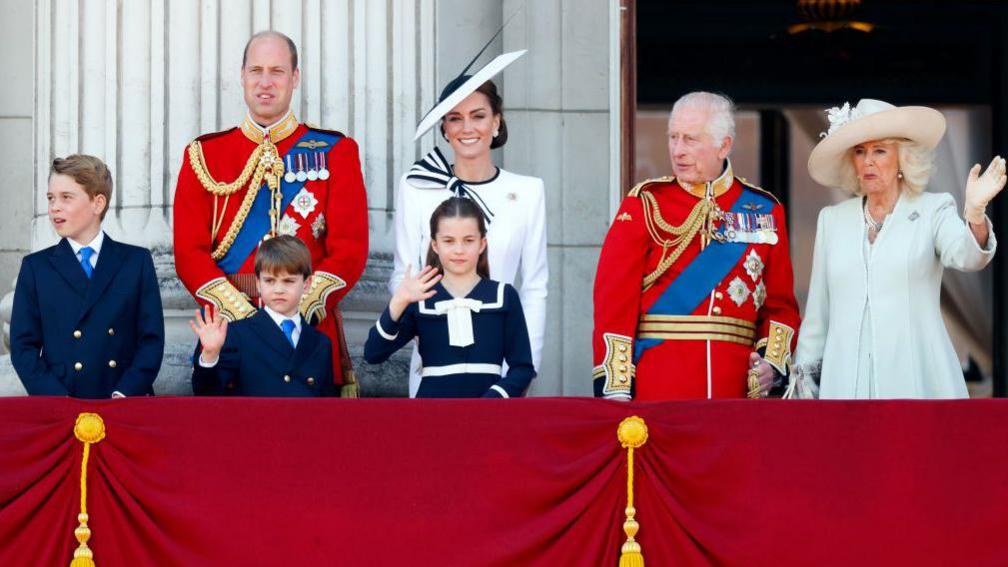Royals really cost £510m, anti-monarchists say

The royals cost more than official figures suggest, anti-monarchists say
- Published
The real cost of the Royal Family to taxpayers is £510m a year - nearly six times more than the £86m of state funding from the annual Sovereign Grant - anti-monarchy campaigners claim.
The Republic group says its higher total includes other factors such as security, not counted in the Sovereign Grant, which it estimates as £150m.
"How can we talk about cutting the winter fuel allowance while wasting half a billion pounds on the royals?" said Republic's chief executive, Graham Smith.
Keeper of the Privy Purse Sir Michael Stevens, who looks after the King's financial affairs, has previously spoken of the "determination to deliver value for money" in royal finances.
The report on royal finances from Republic argues that state funding for the Royal Household, known as the Sovereign Grant, is only a fraction of the real cost to taxpayers.
The anti-monarchists argue that in debates about public spending and tight finances, then the full picture of royal funding needs to be recognised.
The biggest extra hidden cost claimed by Republic is for security for the royals, which isn't part of the calculation of the Sovereign Grant, which covers spending such as staffing, travel and the upkeep of royal buildings.
The anti-monarchy campaign group says the government should provide an accurate figure for the cost of royal security.
But in the absence of an official figure, the report estimates that £150m is "indicative of a likely cost", which they've based on press reports of security costs.
The anti-monarchy group's £510m total also includes "lost income" to taxpayers.
This includes £99m from the property businesses of the duchies of Lancaster and Cornwall, with the report saying that should go to the public purse, rather than funding the King and the Prince of Wales.
A further £96m could be raised in revenue from royal residences if they were used for commercial purposes, claims the report.
Other hidden costs claimed by the report include spending on royal visits by local authorities.
Republic attacks the current funding for the royals as opaque and secretive and a "scandalous abuse of public money".
A head of state should have running costs of £5m-£10m a year, it says, and the King should have an annual salary of £189,000, with increases pegged to that of the prime minister.
Buckingham Palace has declined to comment on the report.
But the latest accounts for the Sovereign Grant, published in July, show state funding for the Royal Household will remain at £86.3m for 2024-25 and rise to £132m in 2025-26.
The level of funding is calculated against the profits of the Crown Estate, with next year's rise reflecting increased income from offshore wind farms.
"This is now the third year for which the Sovereign Grant has not increased by one single penny, despite the supplementary costs incurred by the change of reign and despite the double-digit inflationary pressures that have impacted on goods and services for all organisations in that same period," Sir Michael said earlier this year.
"What has remained constant is the determination to deliver value for money in ensuring the Royal Family are able to serve our communities to the best of their abilities, even in difficult personal circumstances."
Significant divides
As well as costs, there are also harder-to-measure economic benefits from the royals, such as boosting tourism and supporting overseas trade.
In terms of public opinion on royal funding, a YouGov survey last month found 55% of those surveyed by YouGov viewed the monarchy as good value for money, while 30% saw it as poor value.
The institution of the monarchy was seen positively by 59%, negatively by 32%
The King was seen positively by 63%, negatively by 29%
But below these headline figures, there were significant divides, particularly in terms of age groups, with support for the monarchy strongest among older people and opposition strongest among the young.